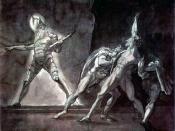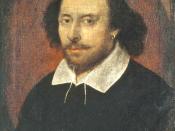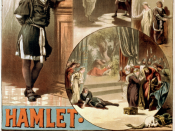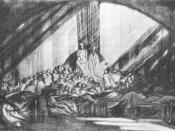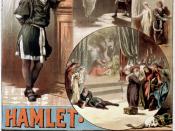POLONIUS: What do you read, my lord?HAMLET: Words, words, words. (II.ii.187-188)Albeit to be taken with a slight pinch of salt, as Hamlet is most likely being sarcastic in the excerpt as he responds to Polonius' question, the quote above highlights the idea that words are the most basic component of any form of writing. Thus, when someone reads a piece of writing, they are ultimately reading each and every word that it encompasses, so the words one chooses can be the difference between a mediocre writer and perhaps the greatest playwright in English history.
Indeed, Shakespeare often plays around with language, and it is through this mischievous wordplay that he adds intellectual depth as well as a witty sense of amusement into his works. Among its numerous forms of wordplay, Hamlet is interspersed with many puns and metaphors.
In his very first lines, Hamlet remarks, in an aside, "A little more than kin, and less than kind" (I.ii.65);
which, already, is an example of the play on words. The main function of this wordplay is to state a paradox in that Claudius is twice related to him, as uncle and stepfather, but not really his kin or kind at all. The word 'kind' may also be a pun meaning both of the same type as well as the idea of being caring and compassionate, which may refer to the eventual revelation of the treachery that Claudius has committed.
Immediately following that, after Claudius finishes his sentence (of which Hamlet had interrupted with his speech), he says, "Not so, my lord, I am too much in the sun" (I.ii.67). This is Hamlet's response to the King's question in the previous line, "How is it that the clouds still hang on you?" On a literal level, it seems a somewhat consistent response since both borrows meteorological imageries, which perhaps can be deciphered as: Why are you gloomy (thinking in the sense of having a cloudy sky)? To which, Hamlet's response could mean: No, I am actually very happy (evoking the idea of sunshine and a sunny weather). However, to look deeper into this exchange, it is not difficult to spot the play on the word "sun" which is too often used as a pun on the word "son". Thus, with the two homonyms in mind, we may interpret Hamlet's response to mean that Claudius has called him "son" once too often, as compared to his likings.
Further into the Act, in the beginning of the last scene, Hamlet describes the Danish practice of blowing trumpets and shooting cannon to celebrate their own drinking as "a custom/More honour'd in the breach than the observance" (I.iv.15-16). This is perhaps a sort of antithesis of the effects of wordplay as this remark is slightly ambiguous especially in an anachronistic context. One of the interpretations of the quote is that the custom is widely ignored or given only lip-service. The other, explains that Hamlet is saying that such traditions it is a long-standing custom because the Danish people make a lot of noise when drinking, however the best way to do honor to that custom would be to drop it altogether. That is to say, it is a good thing if not practiced. The reason for this disparity perhaps lies in the indefinite meanings of the words "honour'd" and "breach". It is interesting to observe Shakespeare's choice of word.
Later in the same scene, Hamlet says, "I'll make a ghost of him that lets me!" (I.iv.85) when his friends, Horatio and Marcellus, tried to keep him from following the Ghost. In the footnote given in Norton, we see that the word "lets" means to hinder, thus here, Hamlet is saying, "I'll make a ghost of anyone who keeps me from the Ghost." The idea of using the word "ghost" as an eponym for that of killing - that is, of murder - seems especially interesting in this context as it is in precisely a ghost who has been murdered that Hamlet is seeking revenge for. This twofold idea seems to further dramatize the central plot of the play.
Thus, already in the very first Act of the play, we experience how words can be twisted around to add depth to the plot. Without even going into the rhetoric and oratory of individual speeches and especially of Hamlets many soliloquies, it is evident that wordplay is possibly one of the most important factors attributing to Shakespeare's success as well as permanence.
BibliographyShakespeare, W. William Shakespeare's Hamlet: A Sourcebook. Ed. Sean McEvoy. New York: Routledge, 2006Shakespeare, W. William Shakespeare'sHamlet, Prince of Denmark. Ed. Constance Jordan. New York: Pearson/Longman, 2004

